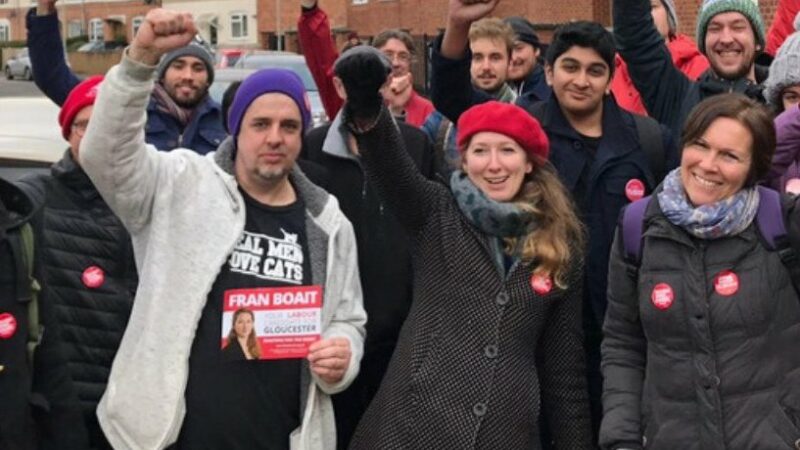
“I joined Labour after Corbyn became leader and McDonnell became Chancellor, when I could see that they were serious about system change and not just tinkering,” Fran Boait explains to me over a cup of tea. We are warming up after a chilly campaigning session in Gloucester.
Fran tells me she only thought of becoming an MP after the 2017 election – when she was “full of hope” – but that she’s always been political. She’s on the Labour left but has a pretty unique political background. Her mum was the Lib Dem deputy leader of the local council, and Fran was a Green Party member herself. She even stood as a paper candidate for council in 2014.
Fran tells me: “The party that shortlisted me was very pro-Corbyn and to the left, and so they were very understanding of people who were in the Green party joining the Labour Party.” And later adds: “The Gloucester Labour that were selecting me were totally fine with it. Maybe not the old-school people but the majority of new active people were fine.”
I ask what politicised her, and she tells me she’s always been interested in the “big questions” of the environment and inequality. But it was the financial crash that really acted as a crystallising moment. Before the crash, she saw people going into finance to make lots of money. She thought it was bad but was mostly neutral on the issue.
“When the global financial crash happened, then the coalition came to power, and it really felt like climate change and the environment were shelved, and obviously austerity was quite shocking.” It became apparent for Fran that the system wasn’t working for people. “I was like ‘oh wow’, the economic system seems to be really screwed up,” she says.
When I ask about what Labour in government could do and what she’d like to work on, Fran goes straight to financial reform. She is, after all, executive director of Positive Money, a not-for-profit organisation that campaigns for reforms to the money and banking system. She says: “I think financial reform will be a challenge if we get in and is something I would want to work on, but I don’t think it’s going to be straightforward.”
Fran explains that she really likes what the Labour Party has outlined in the manifesto – creating a sustainable investment board, establishing a national investments bank with a network of regional banks, and introducing a financial transaction tax. But she tells me: “The bigger question is what we think about how we reform the sector as it is. Because if we look at the financial sector since the crash then really under the Conservatives and the coalition and the Bank of England it feels like it’s been more risk management than rewiring how the thing works.”
She talks of the challenges Labour would face in government: “We still have this oversized global financial centre in London, which could easily undermine the democratic socialist, environmentalist agenda.” She says leaving the financial system as it is would “bite us later on”.
“I don’t think Corbyn or McDonnell think it’s fine as it is – obviously the financial transaction tax is great, and building a banking system which is all about what society needs is great. But we obviously have to think about those institutions which are still there.”
Fran is proud of the local campaign on the ground and of the work Labour members have done in the seat. But she has nerves about December 12th. “It’s going to be really tight… There’s a lot of positivity and it feels like things are going in the right direction here, but I just don’t know if it will be enough.”
The national narrative on the election is an obstacle for Labour here, Fran notes. “It’s not as neutral – the media – as it was in the 2017 general election. It feels much more politicised.” Is Labour’s message cutting through regardless? “On the door – yeah,” Fran tells me. But people don’t already know the policies when she arrives at their door. She says “we have an amazing manifesto” – the challenge is getting people to read it.
I had a mixed response when I went door-knocking in Gloucester: three people shut their door in my face; two said they would be voting Labour; three others were yet to decide. Tory Richard Graham has held the seat since 2010. His majority isn’t huge at 5,520, but is still a significant number to overturn. Doorstep conversations are essential, Fran emphasises, in getting Labour’s positive message across. She emphasises the need for Labour to make clear that “we’re ambitious and we have good ideas”.
The choice facing Gloucester residents is stark, Fran explains. “We are the campaign of hope – they are the campaign of fear, and ramming ‘get Brexit done’ down everyone’s throats.” The real decider could be the extent to which Labour’s hope-fuelled message can cut through. The party is offering real change at this election. And in Fran, Gloucester has a candidate committed to systemic and transformative change, which would overhaul a system that is simply not working for people.




More from LabourList
‘Welfare reforms still mean a climate of fear. Changes are too little, too late’
Welfare bill: Which MPs are still voting against reforms?
‘The tap end is getting hotter – and Welsh Labour might get burned’